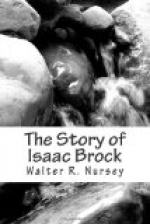Brock may not have been judicially precautious. Had he waited for reinforcements—there were none nearer than Fort George—his own life might possibly have been preserved. As an alternative he could perhaps have withdrawn and sought shelter in the village. But—apart from the peril to his own prestige—who would care to estimate the ulterior effect upon his men if such an example had been set them? These rough Canadian irregulars consisted, as they do to-day, of the finest fighting material in the world. The law of self-preservation had no place in the litany of Isaac Brock. He was a daily dealer in self-sacrifice. Besides, this was not the time or place to calculate involved issues. He was not a cold-blooded politician, nor was he an opportunist; he was merely a patriot and a soldier fighting for hearth and home, for flag and country. It was not an issue that could be left to arbitration in the hereafter, or threshed out by judge and jury. The situation called for instant action. To do his obvious duty rather than to know it, seemed to our hero the only honorable exit from the dilemma, even though it resulted in his own undoing.
Not until the dead are mustered by the God of hosts—at the last roll-call—will this noble soldier’s conception of duty and his sacrifice be truly appraised.
God and the right was carved deep in the heart of Isaac Brock. Though he felt for his men, it was in a compassionate, not a weak way. War without bloodshed was inconceivable. He had been trained in an age and in a school that regarded blood-shedding in the protection of the right as wholly justifiable, as it was inevitable. Is there any change in respect to the application of this doctrine to-day? For himself he had no compassion whatever. His faith in the cause compelled him to fight to a finish. He was not of the potter’s common clay of which fatalists are made. How many of these faithful fellows, he wondered, as his alert mind rapidly reviewed the present and recalled the past—Canadian and Celt, Irish and Anglo-Saxon, Protestant and Catholic, whom “neither politics, sect or creed could, in such a crisis, keep apart”—would leave their bodies to bleach on that hill-side? How many of them were destined to yield their lives for honour’s sake, to die with their valour unrecorded in the defence—in the case of numbers of them—not of their own, but of their brother’s rights?
* * * * *
The next second he was wondering what was doing at St. Peter’s Port or London. It would be noon there. Were the good brothers and sister thinking of “Master Isaac” at that moment? Then, swifter than light, he was at Niagara, and the bowed figure of a woman at a porch, with pale, upturned face, who that morning had bade him a silent farewell, rose before him—surely it was years ago—the woman to whom he was betrothed. Then, in a flash, he turned to see some wavering figures around him, some of his own men—not a few wounded—who faltered and shrank from the screaming buckshot, and dropped to the rear.




